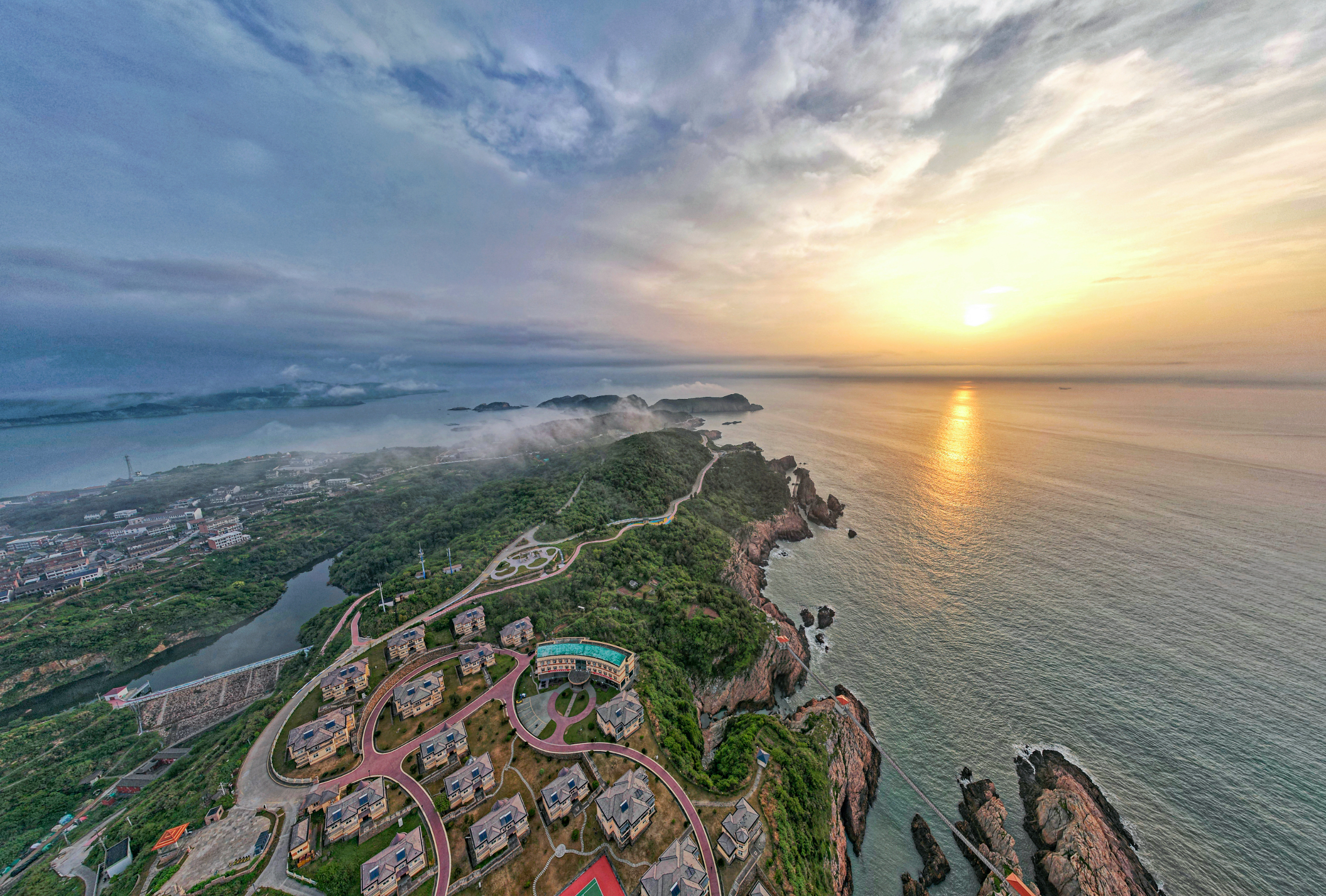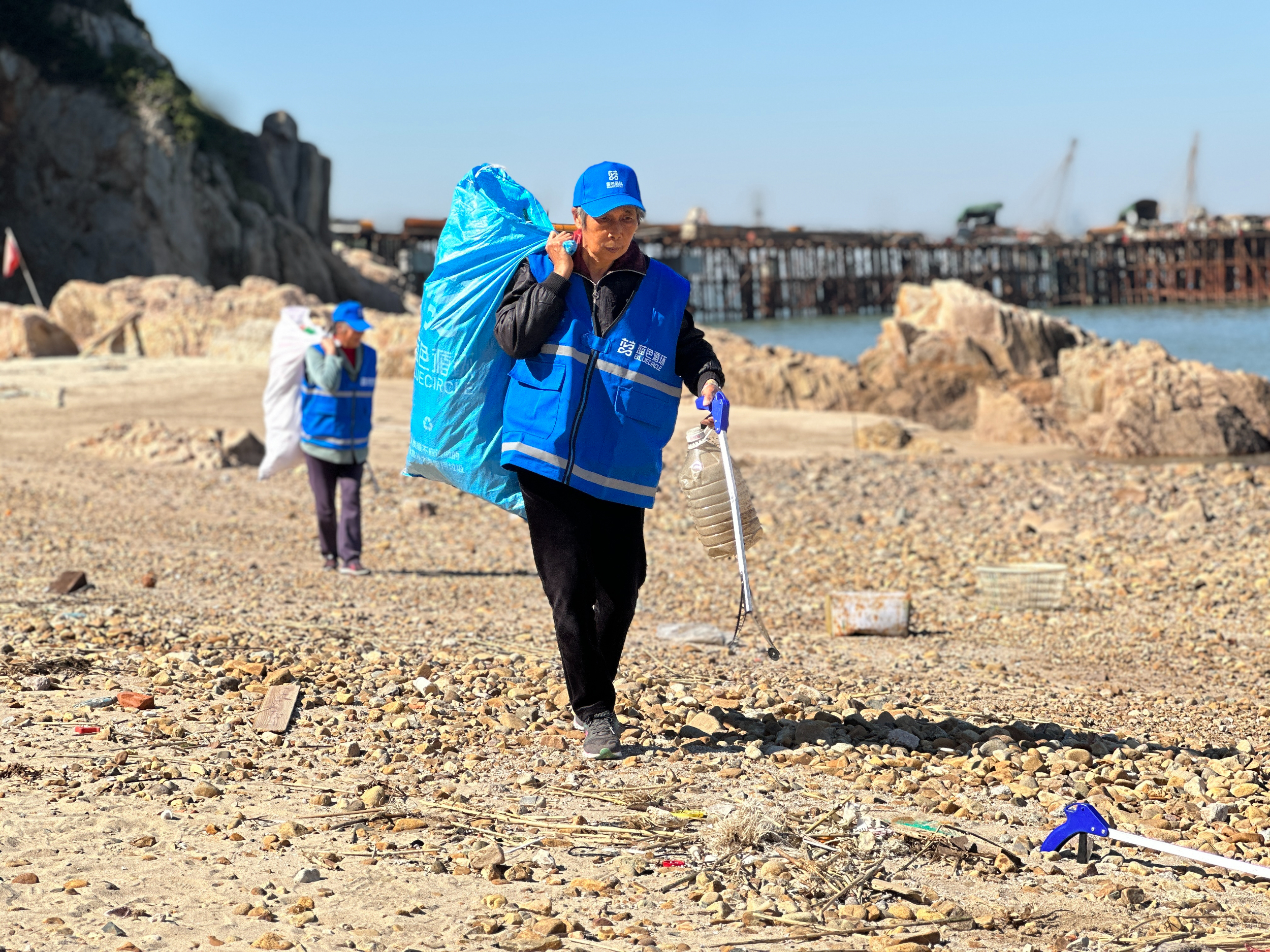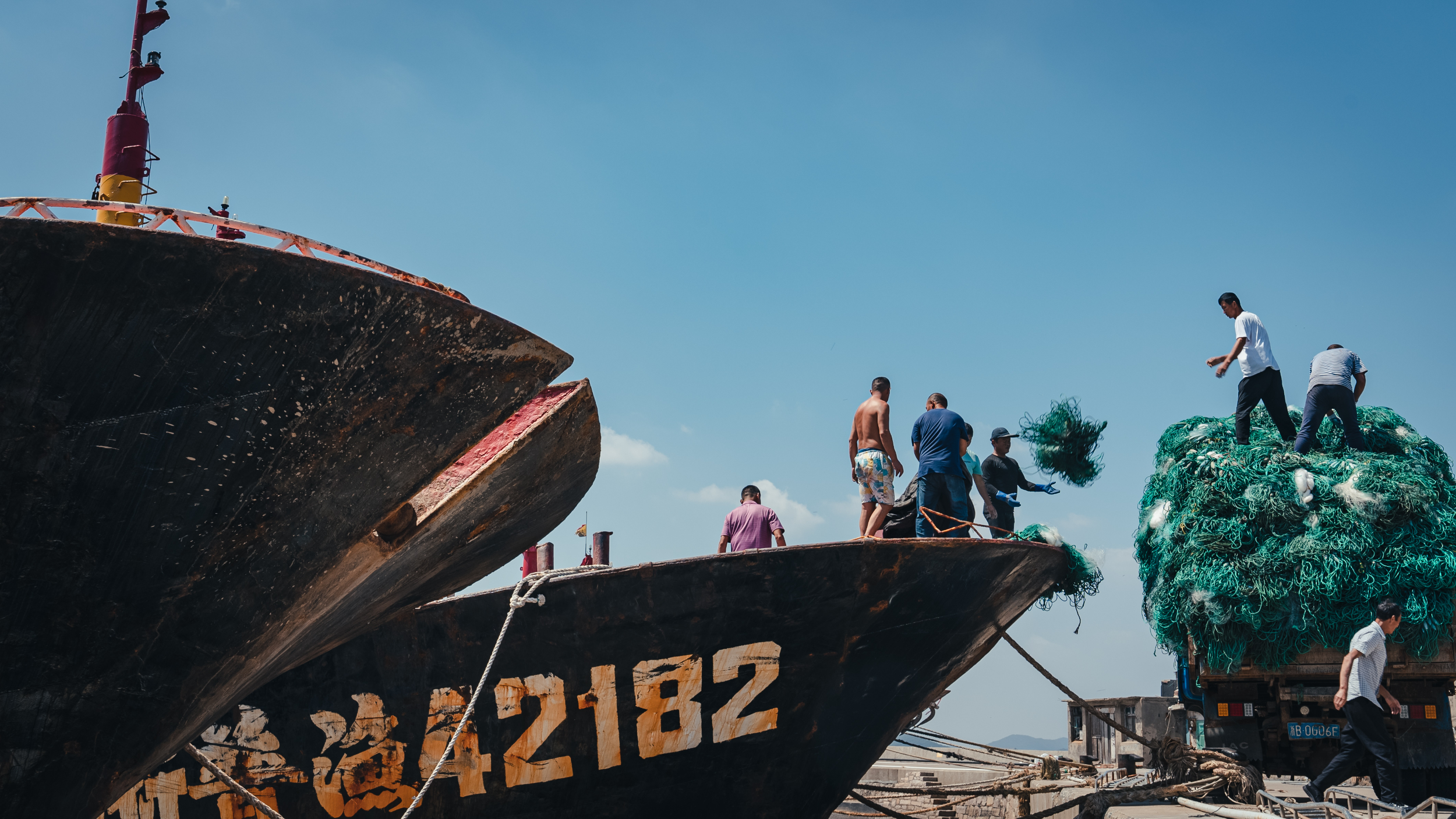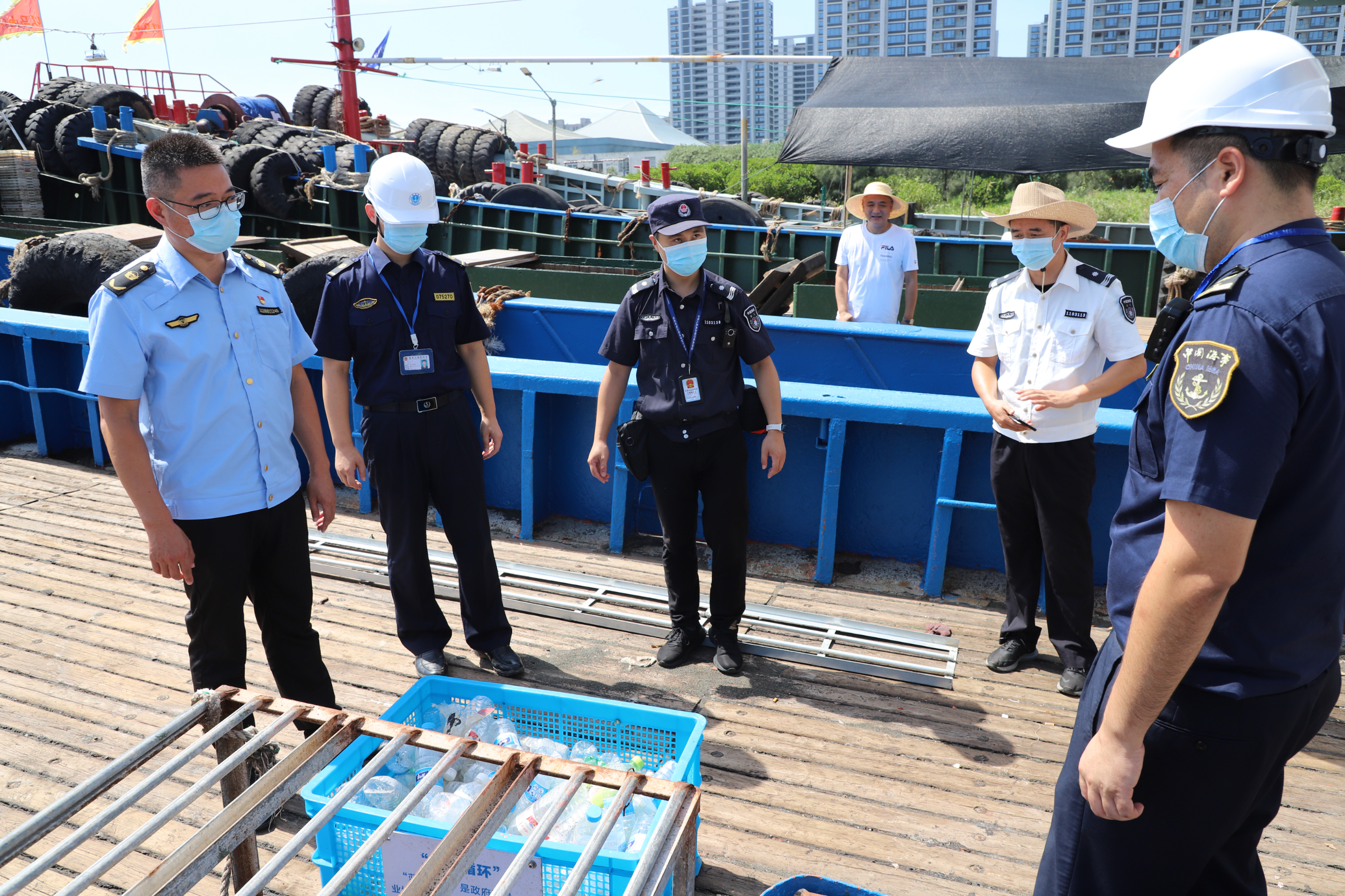Jiaojiang strives to build a closed-loop supervision system for marine waste
At the "Blue Cycle" Ecological Civilization Education Base in Jiaojiang District, Taizhou City, Zhejiang Province, a wall full of jackets, scarves, phone case, etc. are all made from recycling and processing marine garbage. There is a QR code in a prominent position of each product. If you scan it with your mobile phone, the marine plastic traceability page will appear. This is a microcosm of Jiaojiang District's multi-channel and multi-level publicity and science education to mobilize the public to actively participate in marine garbage management.
Not long ago, the "Action Plan for Marine Garbage Cleanup in Coastal Cities"(hereinafter referred to as the "Action Plan") was issued, and a three-year pull-net marine garbage cleanup operation was carried out in 65 bays adjacent to built-up areas of coastal cities and towns across the country. The "Action Plan" requires strengthening publicity and participation, and also clarifies six key tasks, including establishing and improving a normalized management system for marine garbage, timely clearing up shoals and sea-floating garbage, and strengthening the investigation and supervision of marine garbage, to guide coastal areas to form a coordinated management of marine land and sea. Closed loop of garbage management. Jiaojiang had already taken action early.

The picture shows the beautiful scenery of Dachen Island. Map provided by Jiaojiang Branch of Taizhou City Ecological Environment Bureau

The picture shows local residents cleaning up garbage on the beach of Dachen Island. Map provided by Jiaojiang Branch of Taizhou City Ecological Environment Bureau
Strengthen cleaning on demand and improve the level of ocean governance
The Action Plan requires timely cleaning of shoals and sea floating garbage. In order to improve the marine sanitation system and achieve closed-loop management of marine garbage, Jiaojiang clarified the institutions, personnel, and work tasks, carried out regular roving cleaning, and established standardized operation logs. It also implements hierarchical and classified management work of priority management, safety management and deferred management of garbage, carries out regular cleaning and salvage in key areas such as coastal zones, coastal waters, and fishery breeding areas where garbage is prone to accumulation, and implements emergency cleaning and salvage for garbage caused by extreme weather.
Take the 2024 embankment pond, sluice, and beach cleaning service projects in Jiaojiang District as an example. Currently, this project is entrusted by the Agriculture, Rural Affairs and Water Conservancy Bureau of Jiaojiang District to Zhejiang Haisheng Water Conservancy Engineering Co., Ltd. "Except for legal holidays and special weather such as typhoons, no less than 6 cleaners carry out cyclic cleaning every day." Yang Wei, director of the Ditang Culvert and Gate Office of the Agriculture, Rural Affairs and Water Conservancy Bureau of Jiaojiang District, said that once the cleaners encounter problems of unmanageable littering around the dike, they can report the situation to the relevant departments in a timely manner.
It is reported that the Agriculture, Rural Affairs and Water Conservancy Bureau of Jiaojiang District conducts a comprehensive cleaning inspection once a month and evaluates the inspection results to ensure that embankments and ponds are maintained.(i.e., the pavement on the top of the pond, slopes inside the embankment, large feet and suppression layers inside the embankment) is free of garbage, waste and other garbage; the management scope of the sluice (except the indoor office area of the sluice and management room, except the water area upstream of the sluice) is free of garbage, no waste and other garbage; the tidal flats (bounded by the lowest water level after low tide) are free of marine garbage, piles of dead trees and weeds, and no animal carcasses and other sediments.
At present, the coastal beaches and sea sanitation on Dachen Island are mainly cleaned up by the sanitation company entrusted by Dachen Town. According to statistics, in 2023, the measured density of garbage on Dachen Island Beach will be 4.15 pieces/100 square meters, and the measured density of sea floating garbage will be 0.15 pieces/1000 square meters. "Cleaners regularly salvage and increase cleaning efforts as needed." Ye Zongsen, deputy director of the Jiaojiang Ecological Zone Construction Affairs Center, told reporters that the sea floating garbage salvaged by salvage ships and the beach garbage collected from the beach are transferred by small garbage trucks to the garbage treatment plant for temporary storage. After accumulating a certain amount, they are uniformly packaged and transported by transport ships. It is transported to the off-island garbage treatment plant for harmless treatment.
Continuing to improve the modernization level of the marine ecological environment governance system and governance capabilities, Jiaojiang District has not only improved the marine sanitation system, but also improved the marine garbage discovery mechanism. Each department carries out inspections according to its work functions and jurisdiction areas, focusing on checking common marine garbage problem points such as beaches, gates and seas. It uses scientific and technological means such as drones, high-altitude observation, satellites, and other scientific and technological means as well as citizens 'casual photos and ship declarations., law enforcement inspections and other channels to discover problems in a timely, comprehensive and efficient manner, and report them to relevant departments through a closed-loop governance platform.
Digital empowerment and closed-loop supervision completed by the end of the year
The main source of marine debris is plastic waste. The "2023 China Marine Ecological Environment Status Bulletin" released by the Ministry of Ecology and Environment and other departments in May this year showed that in 2023, among the monitoring results of marine garbage in 58 coastal areas across the country, plastic waste accounted for 89.8% of floating garbage on the sea surface, 79.1% of beach garbage and 75.4% of seabed garbage respectively.
The "Blue Cycle" marine debris management project originated in Jiaojiang District has collected more than 13,400 tons of marine debris in the past few years. It has become China's largest marine debris recycling project and won the "Guardian of the Earth Award", the highest environmental honor of the United Nations in 2023. The "Action Plan" encourages learning from innovative models such as "Blue Cycle" to implement diversified and co-management of marine plastic waste management and resource recycling.
As early as 2019, Jiaojiang District pioneered the "Ocean Cloud Warehouse" smart pollution control model. Through "smart equipment + big data + blockchain" technology, it has opened up various links such as collection, transportation, and supervision, realizing that ship pollutants are collected, transported, and easily managed. "In recent years, it has become a habit to bring oil pollution and garbage from sailing back to shore and submit pollutant applications through the 'Fishery Relief' application of 'Zheli Office'. Staff can pick it up in half an hour." Ship boss Cao Junfu said with a smile,"Surrender the oil pollution in time will not only increase the credit rating, but also reduce a lot of interest when borrowing from a bank later."
In 2022, Zhejiang Province proposed the concept of "blue cycle" and used Taizhou City as a provincial pilot. Based on the "Ocean Cloud Warehouse" smart pollution control model, Taizhou City actively explores a new "blue cycle" model for marine plastic pollution control led by the government, enterprise-led, industrial collaboration, and public linkage, and takes the lead in piloting it in Jiaojiang District.
"'Blue Cycle 'is actually an upgraded version of' Ocean Cloud Warehouse ', which is to expand the scope of marine pollutant control from ship oil pollution to marine plastic." Hong Yan, a member of the Party Leadership Group of Jiaojiang Branch of the Taizhou City Ecological Environment Bureau, said that at present, more than 10,000 ships, more than 6000 people and fishermen have joined the "Blue Cycle" marine garbage collection operation, and a total of more than 13,400 tons of marine debris have been collected and processed. Among them, plastic waste reached more than 2822 tons, reducing carbon emissions by approximately 3669 tons.
In order to further strengthen the supervision of marine debris and continuously improve the ecological environment quality of coastal waters, Jiaojiang District is currently striving to build a digital marine garbage management system. Open the digital management screen, and you can see at a glance the status monitoring of marine garbage, pollution source management, cleaning and disposal, and marine plastic recycling. "We started developing this system in March this year and are still in the revision and improvement stage. It is expected that the construction of the digital closed-loop supervision system will be completed by the end of this year."

People have joined the ranks of collecting marine debris and set sail into the sea to salvage marine debris. Map provided by Jiaojiang Branch of Taizhou City Ecological Environment Bureau
Multi-department alliance to form a coordination and cooperation mechanism
The Action Plan requires strengthening supervision and law enforcement, and strengthening shoreline inspections and daily supervision. Not long ago, Jiaojiang Marine Fisheries, Ecological Environment, Comprehensive Law Enforcement, Maritime Affairs and other departments carried out a "one-thing" joint inspection of marine garbage supervision in the offshore waters of Jiaojiang Port and Dachen Island.
In Jiaojiang Port, the marine fishery, ecological environment, maritime affairs, and comprehensive law enforcement departments carry out law enforcement inspections on illegal dumping, illegal stacking of construction waste, and domestic waste on banks and beaches. Law enforcement officers carry out boarding inspections on ships in the port, focusing on domestic sewage disposal, classified garbage disposal, and dock pollutant discharge. If the disposal is not in place or the discharge is not up to standard, they issue notices ordering corrections within a time limit and provide on-site technical guidance to ensure that rivers, Coastal and beach garbage does not enter downstream or enter the sea.
In Dachen Town, the marine fishery and comprehensive law enforcement departments conduct administrative inspections on pollutant emissions from fishing ports, ships and yellow croaker breeding areas, and pollution in fishing port waters, requiring the construction and improvement of supporting garbage collection and transfer facilities, and supervising and guiding the collection of fishery production and domestic garbage at sea and onshore Centralized disposal.

The picture shows multiple departments jointly carrying out law enforcement and supervision of marine garbage in coastal waters. Map provided by Jiaojiang Branch of Taizhou City Ecological Environment Bureau
In order to continuously improve the ecological environment in coastal waters and effectively unite the law enforcement forces of various departments, in August 2022, Jiaojiang District established a special class for marine garbage supervision and law enforcement in coastal waters. In the month of its establishment, Jiaojiang Ecological Environment, Agriculture and Rural Affairs, Water Conservancy, Maritime Affairs and other departments jointly carried out marine garbage law enforcement and supervision actions in coastal waters.
"We have successively gone to the Jiazhi Aquatic Products Market Terminal, Taizhou Power Plant Terminal and other areas to carry out inspections and law enforcement on marine garbage and fishing vessel oil pollution recovery to further strengthen the source control of marine garbage." Ye Zongsen said that he is striving to further strengthen pollution prevention and control in coastal waters in Jiaojiang District through joint actions and severely crack down on illegal activities that pollute the marine environment and destroy the marine ecology. We will take this as an opportunity to strengthen land and sea coordination, coordination and linkage, and comprehensive management, promote the sharing of resources and information in marine ecological environment administrative management and administrative law enforcement, and work together to form a multi-departmental coordination and cooperation mechanism for maritime law enforcement and supervision.
In the next step, Jiaojiang District will further promote the implementation of a series of standards and systems such as source control of marine garbage, supervision and law enforcement, recycling, and carbon trading rules, and build a working situation in which each performs its own duties, concentrates on efforts, and collaborates. Continue to improve the ecological environment quality of coastal waters through typical leadership, point-to-point and steady advancement, and create a Zhejiang standard that marine garbage management empowers people and the industrial chain to achieve common prosperity.







